Holiday Inn: Internal and External Stakeholder Impact Report
VerifiedAdded on 2023/01/12
|12
|3403
|98
Report
AI Summary
This report provides a comprehensive analysis of stakeholder impact on Holiday Inn's brand development. It begins with an introduction to strategic brand management and brand equity, followed by an overview of Holiday Inn's operations and services. The report then delves into the sources of brand equity for Holiday Inn, emphasizing brand awareness and local marketing performance. A significant portion is dedicated to the role and impact of internal stakeholders, including employees and general managers, detailing how they contribute to building the service brand and how they are managed. The report also explores the role of external stakeholders such as customers and suppliers and their influence on the brand. Finally, it concludes by summarizing the key findings and implications of stakeholder management for Holiday Inn's continued success in the competitive hotel industry. The report highlights the importance of understanding and effectively managing both internal and external stakeholders to foster brand equity and achieve long-term sustainability.

Stakeholder impact
1
1
Paraphrase This Document
Need a fresh take? Get an instant paraphrase of this document with our AI Paraphraser
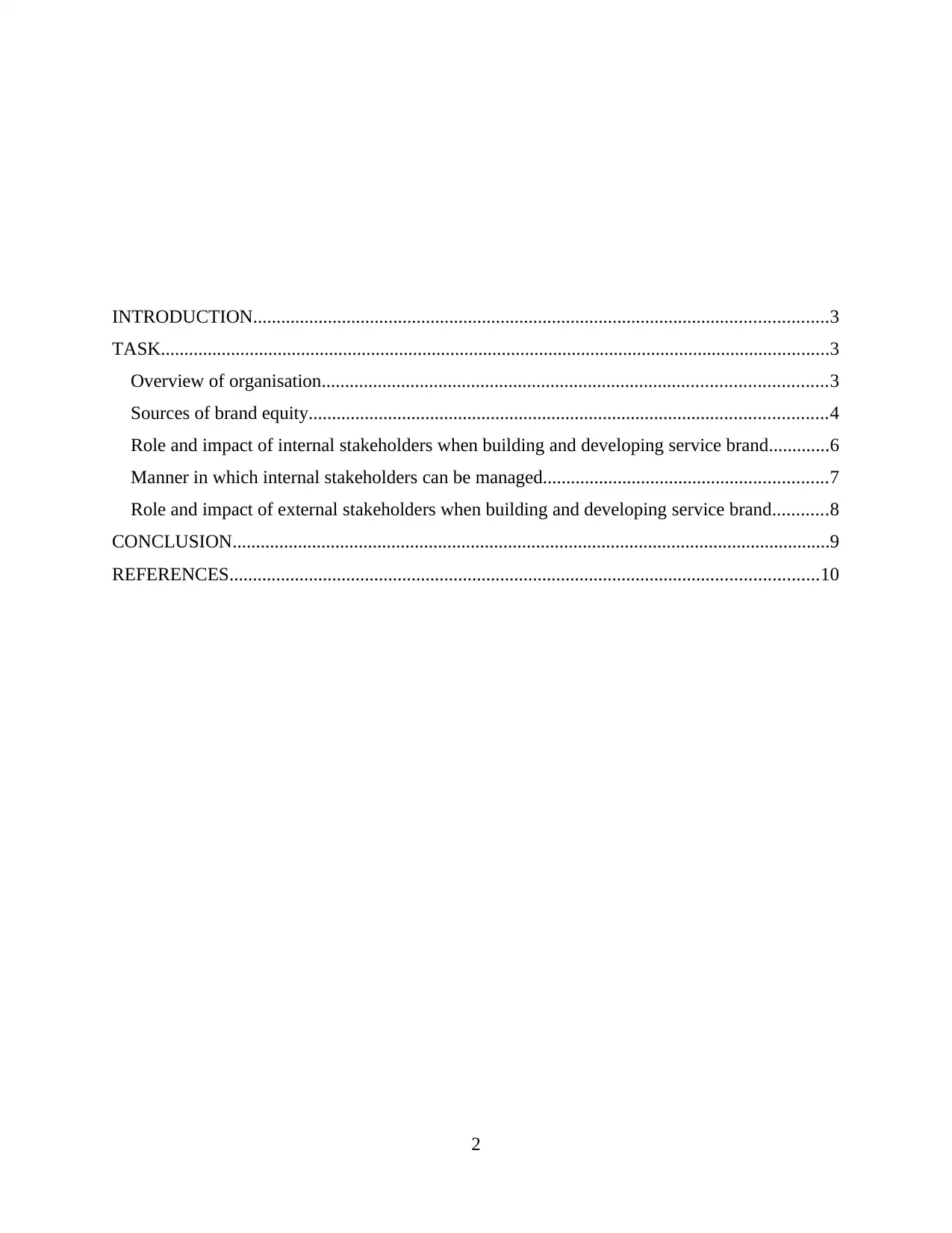
INTRODUCTION...........................................................................................................................3
TASK...............................................................................................................................................3
Overview of organisation............................................................................................................3
Sources of brand equity...............................................................................................................4
Role and impact of internal stakeholders when building and developing service brand.............6
Manner in which internal stakeholders can be managed.............................................................7
Role and impact of external stakeholders when building and developing service brand............8
CONCLUSION................................................................................................................................9
REFERENCES..............................................................................................................................10
2
TASK...............................................................................................................................................3
Overview of organisation............................................................................................................3
Sources of brand equity...............................................................................................................4
Role and impact of internal stakeholders when building and developing service brand.............6
Manner in which internal stakeholders can be managed.............................................................7
Role and impact of external stakeholders when building and developing service brand............8
CONCLUSION................................................................................................................................9
REFERENCES..............................................................................................................................10
2
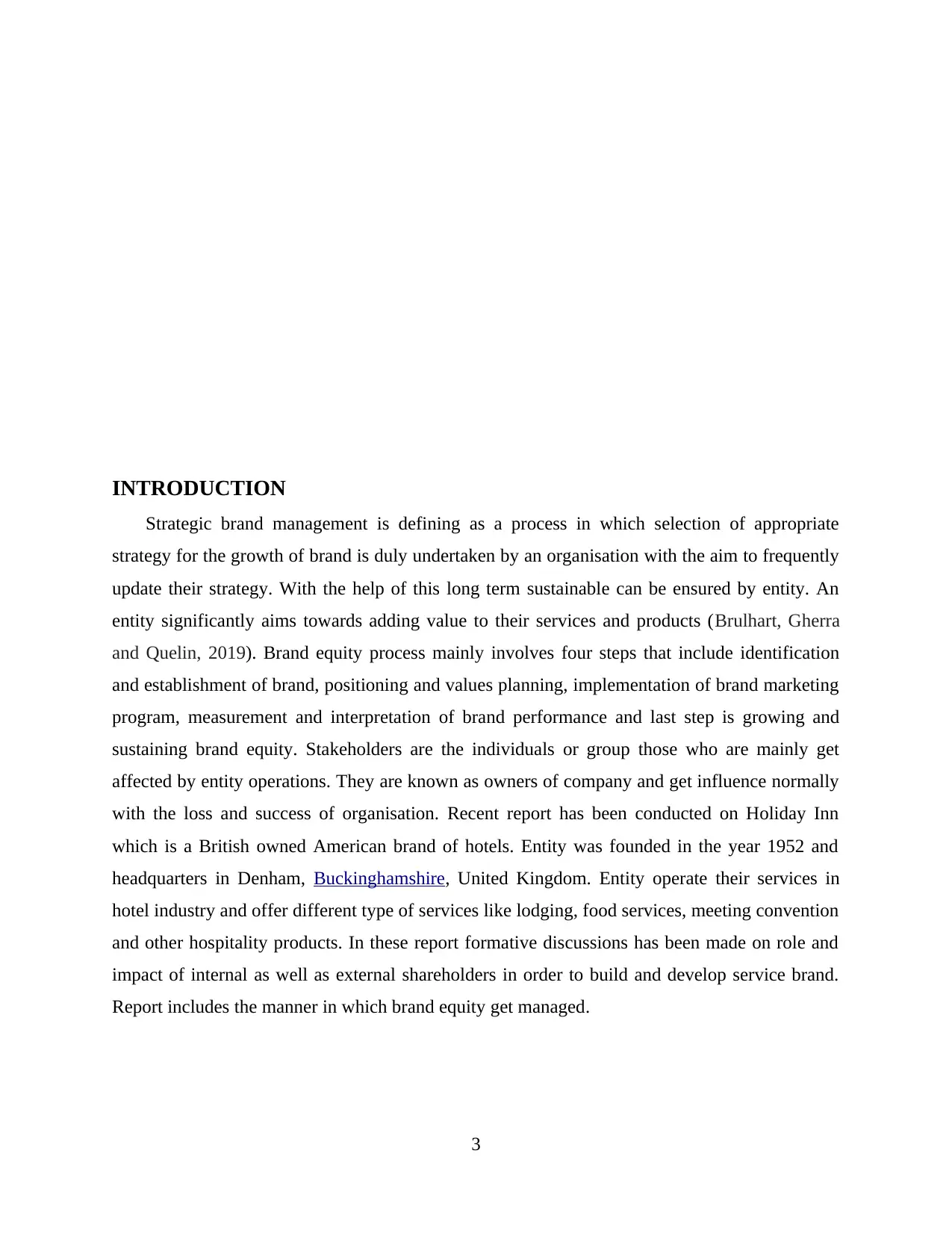
INTRODUCTION
Strategic brand management is defining as a process in which selection of appropriate
strategy for the growth of brand is duly undertaken by an organisation with the aim to frequently
update their strategy. With the help of this long term sustainable can be ensured by entity. An
entity significantly aims towards adding value to their services and products (Brulhart, Gherra
and Quelin, 2019). Brand equity process mainly involves four steps that include identification
and establishment of brand, positioning and values planning, implementation of brand marketing
program, measurement and interpretation of brand performance and last step is growing and
sustaining brand equity. Stakeholders are the individuals or group those who are mainly get
affected by entity operations. They are known as owners of company and get influence normally
with the loss and success of organisation. Recent report has been conducted on Holiday Inn
which is a British owned American brand of hotels. Entity was founded in the year 1952 and
headquarters in Denham, Buckinghamshire, United Kingdom. Entity operate their services in
hotel industry and offer different type of services like lodging, food services, meeting convention
and other hospitality products. In these report formative discussions has been made on role and
impact of internal as well as external shareholders in order to build and develop service brand.
Report includes the manner in which brand equity get managed.
3
Strategic brand management is defining as a process in which selection of appropriate
strategy for the growth of brand is duly undertaken by an organisation with the aim to frequently
update their strategy. With the help of this long term sustainable can be ensured by entity. An
entity significantly aims towards adding value to their services and products (Brulhart, Gherra
and Quelin, 2019). Brand equity process mainly involves four steps that include identification
and establishment of brand, positioning and values planning, implementation of brand marketing
program, measurement and interpretation of brand performance and last step is growing and
sustaining brand equity. Stakeholders are the individuals or group those who are mainly get
affected by entity operations. They are known as owners of company and get influence normally
with the loss and success of organisation. Recent report has been conducted on Holiday Inn
which is a British owned American brand of hotels. Entity was founded in the year 1952 and
headquarters in Denham, Buckinghamshire, United Kingdom. Entity operate their services in
hotel industry and offer different type of services like lodging, food services, meeting convention
and other hospitality products. In these report formative discussions has been made on role and
impact of internal as well as external shareholders in order to build and develop service brand.
Report includes the manner in which brand equity get managed.
3
⊘ This is a preview!⊘
Do you want full access?
Subscribe today to unlock all pages.

Trusted by 1+ million students worldwide
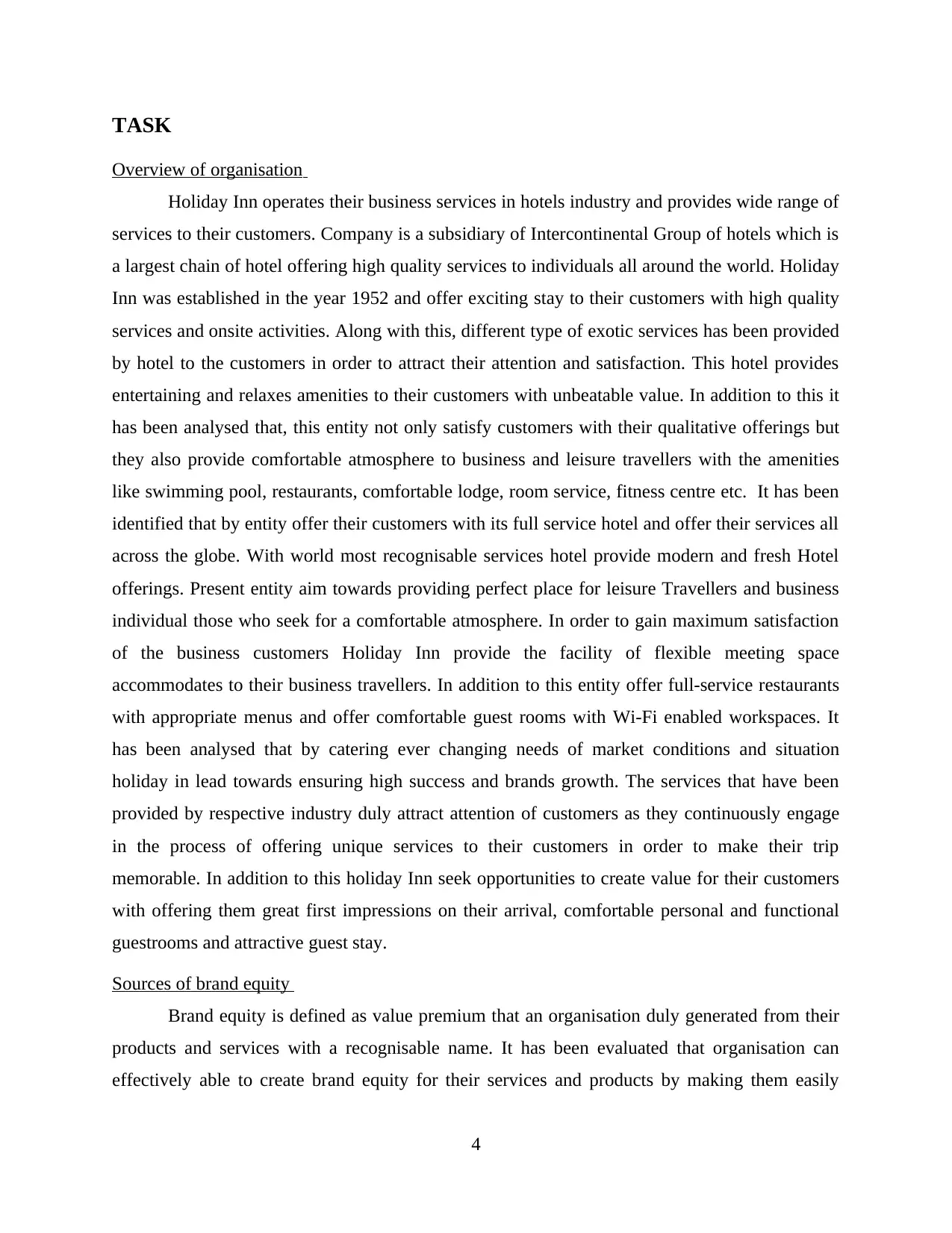
TASK
Overview of organisation
Holiday Inn operates their business services in hotels industry and provides wide range of
services to their customers. Company is a subsidiary of Intercontinental Group of hotels which is
a largest chain of hotel offering high quality services to individuals all around the world. Holiday
Inn was established in the year 1952 and offer exciting stay to their customers with high quality
services and onsite activities. Along with this, different type of exotic services has been provided
by hotel to the customers in order to attract their attention and satisfaction. This hotel provides
entertaining and relaxes amenities to their customers with unbeatable value. In addition to this it
has been analysed that, this entity not only satisfy customers with their qualitative offerings but
they also provide comfortable atmosphere to business and leisure travellers with the amenities
like swimming pool, restaurants, comfortable lodge, room service, fitness centre etc. It has been
identified that by entity offer their customers with its full service hotel and offer their services all
across the globe. With world most recognisable services hotel provide modern and fresh Hotel
offerings. Present entity aim towards providing perfect place for leisure Travellers and business
individual those who seek for a comfortable atmosphere. In order to gain maximum satisfaction
of the business customers Holiday Inn provide the facility of flexible meeting space
accommodates to their business travellers. In addition to this entity offer full-service restaurants
with appropriate menus and offer comfortable guest rooms with Wi-Fi enabled workspaces. It
has been analysed that by catering ever changing needs of market conditions and situation
holiday in lead towards ensuring high success and brands growth. The services that have been
provided by respective industry duly attract attention of customers as they continuously engage
in the process of offering unique services to their customers in order to make their trip
memorable. In addition to this holiday Inn seek opportunities to create value for their customers
with offering them great first impressions on their arrival, comfortable personal and functional
guestrooms and attractive guest stay.
Sources of brand equity
Brand equity is defined as value premium that an organisation duly generated from their
products and services with a recognisable name. It has been evaluated that organisation can
effectively able to create brand equity for their services and products by making them easily
4
Overview of organisation
Holiday Inn operates their business services in hotels industry and provides wide range of
services to their customers. Company is a subsidiary of Intercontinental Group of hotels which is
a largest chain of hotel offering high quality services to individuals all around the world. Holiday
Inn was established in the year 1952 and offer exciting stay to their customers with high quality
services and onsite activities. Along with this, different type of exotic services has been provided
by hotel to the customers in order to attract their attention and satisfaction. This hotel provides
entertaining and relaxes amenities to their customers with unbeatable value. In addition to this it
has been analysed that, this entity not only satisfy customers with their qualitative offerings but
they also provide comfortable atmosphere to business and leisure travellers with the amenities
like swimming pool, restaurants, comfortable lodge, room service, fitness centre etc. It has been
identified that by entity offer their customers with its full service hotel and offer their services all
across the globe. With world most recognisable services hotel provide modern and fresh Hotel
offerings. Present entity aim towards providing perfect place for leisure Travellers and business
individual those who seek for a comfortable atmosphere. In order to gain maximum satisfaction
of the business customers Holiday Inn provide the facility of flexible meeting space
accommodates to their business travellers. In addition to this entity offer full-service restaurants
with appropriate menus and offer comfortable guest rooms with Wi-Fi enabled workspaces. It
has been analysed that by catering ever changing needs of market conditions and situation
holiday in lead towards ensuring high success and brands growth. The services that have been
provided by respective industry duly attract attention of customers as they continuously engage
in the process of offering unique services to their customers in order to make their trip
memorable. In addition to this holiday Inn seek opportunities to create value for their customers
with offering them great first impressions on their arrival, comfortable personal and functional
guestrooms and attractive guest stay.
Sources of brand equity
Brand equity is defined as value premium that an organisation duly generated from their
products and services with a recognisable name. It has been evaluated that organisation can
effectively able to create brand equity for their services and products by making them easily
4
Paraphrase This Document
Need a fresh take? Get an instant paraphrase of this document with our AI Paraphraser
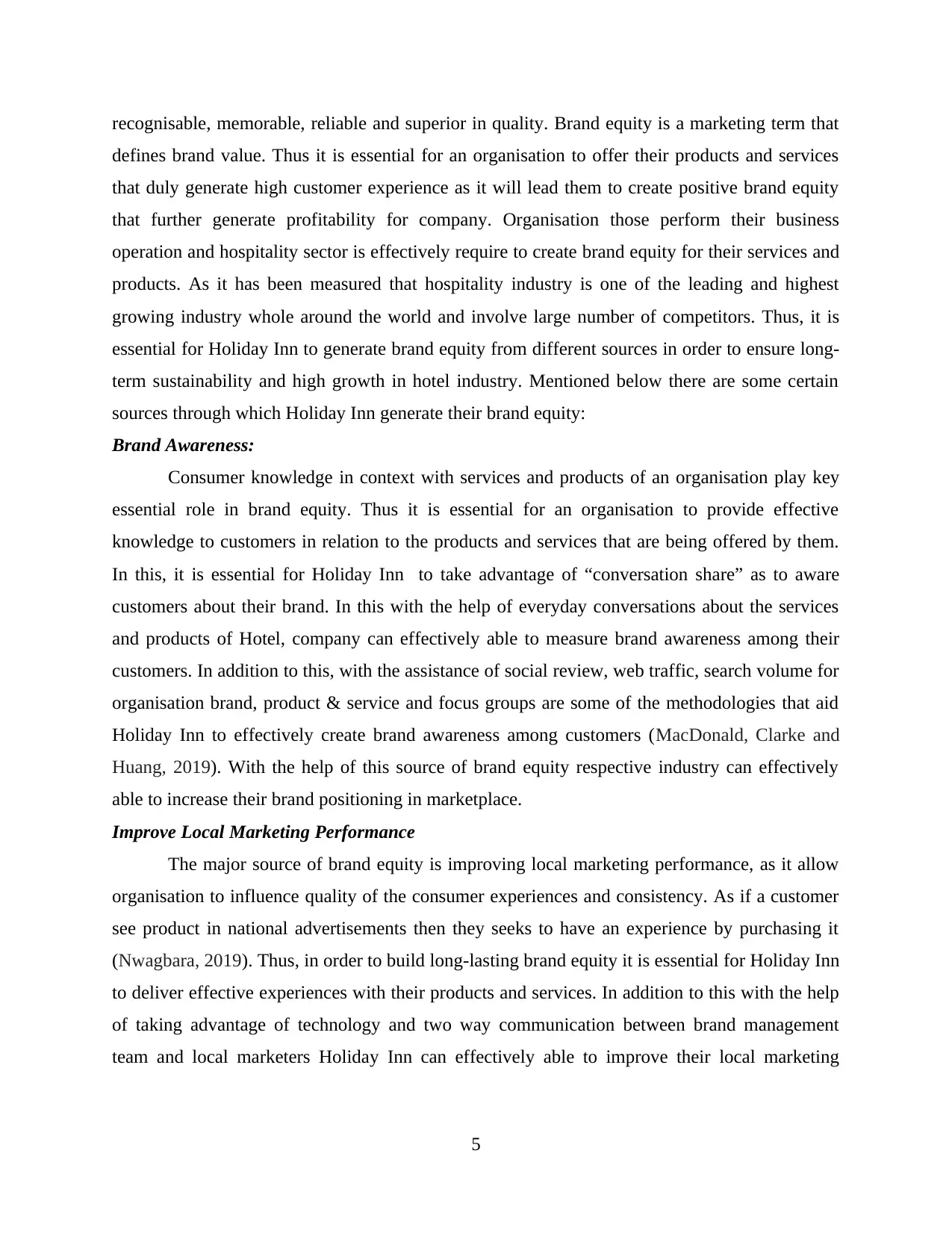
recognisable, memorable, reliable and superior in quality. Brand equity is a marketing term that
defines brand value. Thus it is essential for an organisation to offer their products and services
that duly generate high customer experience as it will lead them to create positive brand equity
that further generate profitability for company. Organisation those perform their business
operation and hospitality sector is effectively require to create brand equity for their services and
products. As it has been measured that hospitality industry is one of the leading and highest
growing industry whole around the world and involve large number of competitors. Thus, it is
essential for Holiday Inn to generate brand equity from different sources in order to ensure long-
term sustainability and high growth in hotel industry. Mentioned below there are some certain
sources through which Holiday Inn generate their brand equity:
Brand Awareness:
Consumer knowledge in context with services and products of an organisation play key
essential role in brand equity. Thus it is essential for an organisation to provide effective
knowledge to customers in relation to the products and services that are being offered by them.
In this, it is essential for Holiday Inn to take advantage of “conversation share” as to aware
customers about their brand. In this with the help of everyday conversations about the services
and products of Hotel, company can effectively able to measure brand awareness among their
customers. In addition to this, with the assistance of social review, web traffic, search volume for
organisation brand, product & service and focus groups are some of the methodologies that aid
Holiday Inn to effectively create brand awareness among customers (MacDonald, Clarke and
Huang, 2019). With the help of this source of brand equity respective industry can effectively
able to increase their brand positioning in marketplace.
Improve Local Marketing Performance
The major source of brand equity is improving local marketing performance, as it allow
organisation to influence quality of the consumer experiences and consistency. As if a customer
see product in national advertisements then they seeks to have an experience by purchasing it
(Nwagbara, 2019). Thus, in order to build long-lasting brand equity it is essential for Holiday Inn
to deliver effective experiences with their products and services. In addition to this with the help
of taking advantage of technology and two way communication between brand management
team and local marketers Holiday Inn can effectively able to improve their local marketing
5
defines brand value. Thus it is essential for an organisation to offer their products and services
that duly generate high customer experience as it will lead them to create positive brand equity
that further generate profitability for company. Organisation those perform their business
operation and hospitality sector is effectively require to create brand equity for their services and
products. As it has been measured that hospitality industry is one of the leading and highest
growing industry whole around the world and involve large number of competitors. Thus, it is
essential for Holiday Inn to generate brand equity from different sources in order to ensure long-
term sustainability and high growth in hotel industry. Mentioned below there are some certain
sources through which Holiday Inn generate their brand equity:
Brand Awareness:
Consumer knowledge in context with services and products of an organisation play key
essential role in brand equity. Thus it is essential for an organisation to provide effective
knowledge to customers in relation to the products and services that are being offered by them.
In this, it is essential for Holiday Inn to take advantage of “conversation share” as to aware
customers about their brand. In this with the help of everyday conversations about the services
and products of Hotel, company can effectively able to measure brand awareness among their
customers. In addition to this, with the assistance of social review, web traffic, search volume for
organisation brand, product & service and focus groups are some of the methodologies that aid
Holiday Inn to effectively create brand awareness among customers (MacDonald, Clarke and
Huang, 2019). With the help of this source of brand equity respective industry can effectively
able to increase their brand positioning in marketplace.
Improve Local Marketing Performance
The major source of brand equity is improving local marketing performance, as it allow
organisation to influence quality of the consumer experiences and consistency. As if a customer
see product in national advertisements then they seeks to have an experience by purchasing it
(Nwagbara, 2019). Thus, in order to build long-lasting brand equity it is essential for Holiday Inn
to deliver effective experiences with their products and services. In addition to this with the help
of taking advantage of technology and two way communication between brand management
team and local marketers Holiday Inn can effectively able to improve their local marketing
5
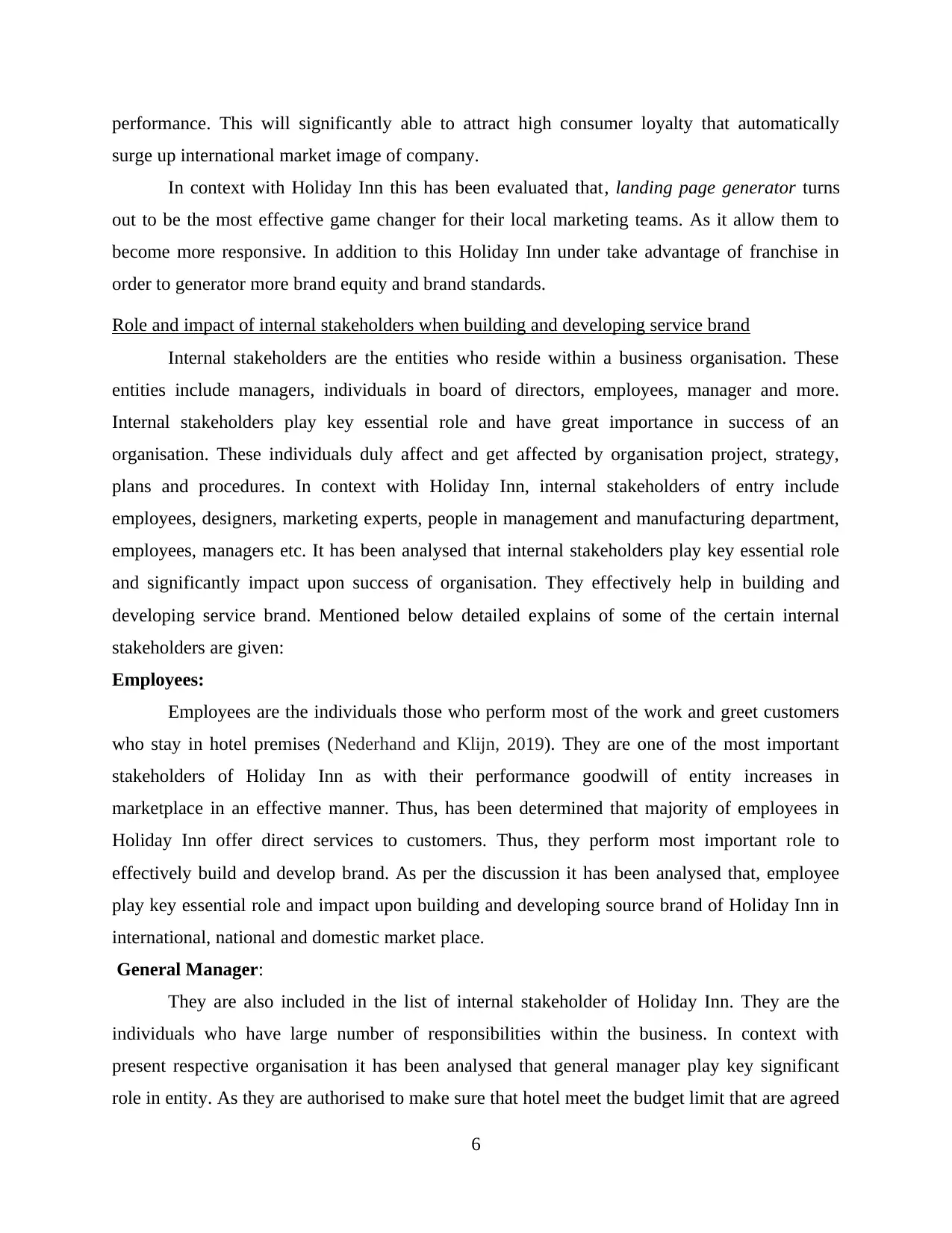
performance. This will significantly able to attract high consumer loyalty that automatically
surge up international market image of company.
In context with Holiday Inn this has been evaluated that, landing page generator turns
out to be the most effective game changer for their local marketing teams. As it allow them to
become more responsive. In addition to this Holiday Inn under take advantage of franchise in
order to generator more brand equity and brand standards.
Role and impact of internal stakeholders when building and developing service brand
Internal stakeholders are the entities who reside within a business organisation. These
entities include managers, individuals in board of directors, employees, manager and more.
Internal stakeholders play key essential role and have great importance in success of an
organisation. These individuals duly affect and get affected by organisation project, strategy,
plans and procedures. In context with Holiday Inn, internal stakeholders of entry include
employees, designers, marketing experts, people in management and manufacturing department,
employees, managers etc. It has been analysed that internal stakeholders play key essential role
and significantly impact upon success of organisation. They effectively help in building and
developing service brand. Mentioned below detailed explains of some of the certain internal
stakeholders are given:
Employees:
Employees are the individuals those who perform most of the work and greet customers
who stay in hotel premises (Nederhand and Klijn, 2019). They are one of the most important
stakeholders of Holiday Inn as with their performance goodwill of entity increases in
marketplace in an effective manner. Thus, has been determined that majority of employees in
Holiday Inn offer direct services to customers. Thus, they perform most important role to
effectively build and develop brand. As per the discussion it has been analysed that, employee
play key essential role and impact upon building and developing source brand of Holiday Inn in
international, national and domestic market place.
General Manager:
They are also included in the list of internal stakeholder of Holiday Inn. They are the
individuals who have large number of responsibilities within the business. In context with
present respective organisation it has been analysed that general manager play key significant
role in entity. As they are authorised to make sure that hotel meet the budget limit that are agreed
6
surge up international market image of company.
In context with Holiday Inn this has been evaluated that, landing page generator turns
out to be the most effective game changer for their local marketing teams. As it allow them to
become more responsive. In addition to this Holiday Inn under take advantage of franchise in
order to generator more brand equity and brand standards.
Role and impact of internal stakeholders when building and developing service brand
Internal stakeholders are the entities who reside within a business organisation. These
entities include managers, individuals in board of directors, employees, manager and more.
Internal stakeholders play key essential role and have great importance in success of an
organisation. These individuals duly affect and get affected by organisation project, strategy,
plans and procedures. In context with Holiday Inn, internal stakeholders of entry include
employees, designers, marketing experts, people in management and manufacturing department,
employees, managers etc. It has been analysed that internal stakeholders play key essential role
and significantly impact upon success of organisation. They effectively help in building and
developing service brand. Mentioned below detailed explains of some of the certain internal
stakeholders are given:
Employees:
Employees are the individuals those who perform most of the work and greet customers
who stay in hotel premises (Nederhand and Klijn, 2019). They are one of the most important
stakeholders of Holiday Inn as with their performance goodwill of entity increases in
marketplace in an effective manner. Thus, has been determined that majority of employees in
Holiday Inn offer direct services to customers. Thus, they perform most important role to
effectively build and develop brand. As per the discussion it has been analysed that, employee
play key essential role and impact upon building and developing source brand of Holiday Inn in
international, national and domestic market place.
General Manager:
They are also included in the list of internal stakeholder of Holiday Inn. They are the
individuals who have large number of responsibilities within the business. In context with
present respective organisation it has been analysed that general manager play key significant
role in entity. As they are authorised to make sure that hotel meet the budget limit that are agreed
6
⊘ This is a preview!⊘
Do you want full access?
Subscribe today to unlock all pages.

Trusted by 1+ million students worldwide
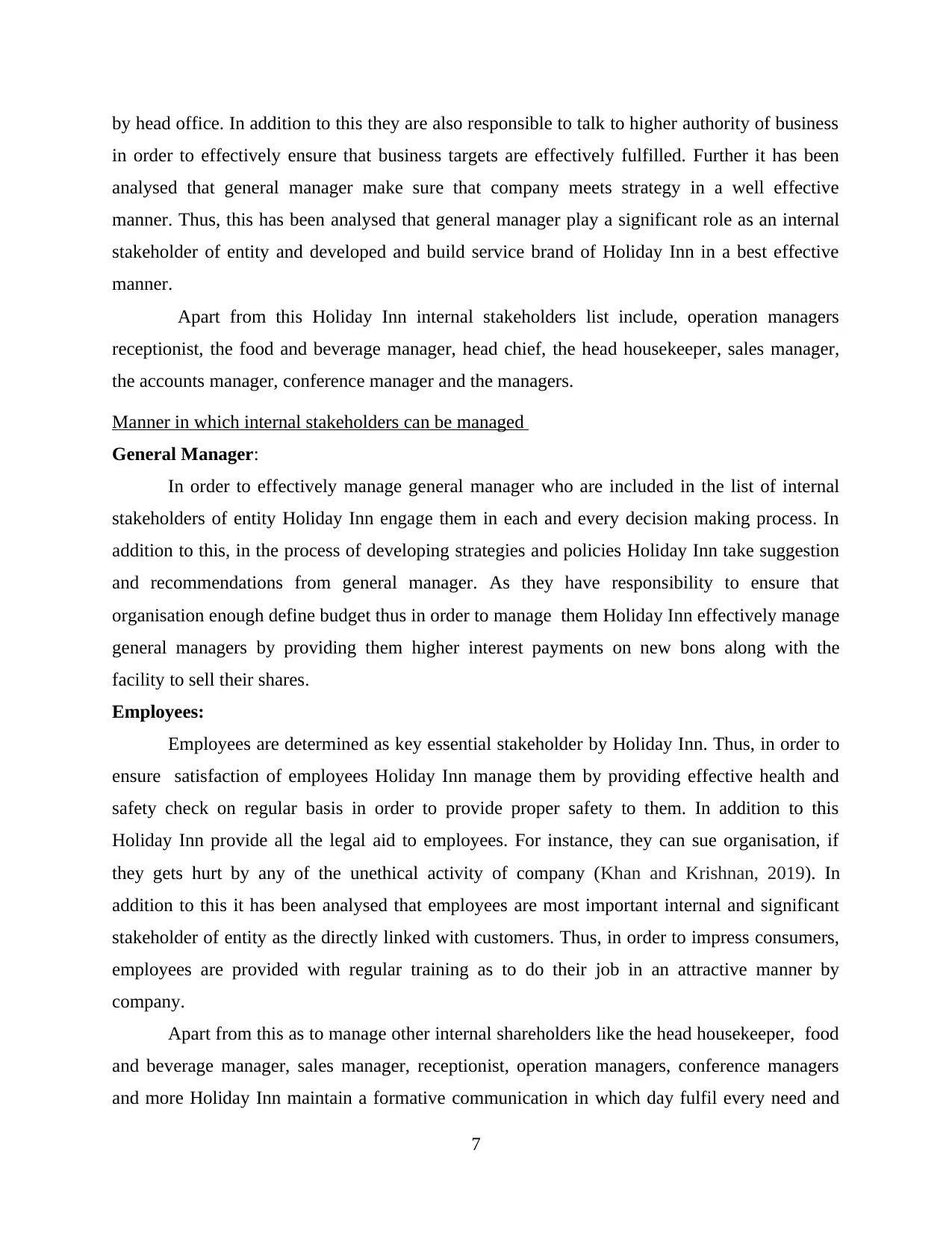
by head office. In addition to this they are also responsible to talk to higher authority of business
in order to effectively ensure that business targets are effectively fulfilled. Further it has been
analysed that general manager make sure that company meets strategy in a well effective
manner. Thus, this has been analysed that general manager play a significant role as an internal
stakeholder of entity and developed and build service brand of Holiday Inn in a best effective
manner.
Apart from this Holiday Inn internal stakeholders list include, operation managers
receptionist, the food and beverage manager, head chief, the head housekeeper, sales manager,
the accounts manager, conference manager and the managers.
Manner in which internal stakeholders can be managed
General Manager:
In order to effectively manage general manager who are included in the list of internal
stakeholders of entity Holiday Inn engage them in each and every decision making process. In
addition to this, in the process of developing strategies and policies Holiday Inn take suggestion
and recommendations from general manager. As they have responsibility to ensure that
organisation enough define budget thus in order to manage them Holiday Inn effectively manage
general managers by providing them higher interest payments on new bons along with the
facility to sell their shares.
Employees:
Employees are determined as key essential stakeholder by Holiday Inn. Thus, in order to
ensure satisfaction of employees Holiday Inn manage them by providing effective health and
safety check on regular basis in order to provide proper safety to them. In addition to this
Holiday Inn provide all the legal aid to employees. For instance, they can sue organisation, if
they gets hurt by any of the unethical activity of company (Khan and Krishnan, 2019). In
addition to this it has been analysed that employees are most important internal and significant
stakeholder of entity as the directly linked with customers. Thus, in order to impress consumers,
employees are provided with regular training as to do their job in an attractive manner by
company.
Apart from this as to manage other internal shareholders like the head housekeeper, food
and beverage manager, sales manager, receptionist, operation managers, conference managers
and more Holiday Inn maintain a formative communication in which day fulfil every need and
7
in order to effectively ensure that business targets are effectively fulfilled. Further it has been
analysed that general manager make sure that company meets strategy in a well effective
manner. Thus, this has been analysed that general manager play a significant role as an internal
stakeholder of entity and developed and build service brand of Holiday Inn in a best effective
manner.
Apart from this Holiday Inn internal stakeholders list include, operation managers
receptionist, the food and beverage manager, head chief, the head housekeeper, sales manager,
the accounts manager, conference manager and the managers.
Manner in which internal stakeholders can be managed
General Manager:
In order to effectively manage general manager who are included in the list of internal
stakeholders of entity Holiday Inn engage them in each and every decision making process. In
addition to this, in the process of developing strategies and policies Holiday Inn take suggestion
and recommendations from general manager. As they have responsibility to ensure that
organisation enough define budget thus in order to manage them Holiday Inn effectively manage
general managers by providing them higher interest payments on new bons along with the
facility to sell their shares.
Employees:
Employees are determined as key essential stakeholder by Holiday Inn. Thus, in order to
ensure satisfaction of employees Holiday Inn manage them by providing effective health and
safety check on regular basis in order to provide proper safety to them. In addition to this
Holiday Inn provide all the legal aid to employees. For instance, they can sue organisation, if
they gets hurt by any of the unethical activity of company (Khan and Krishnan, 2019). In
addition to this it has been analysed that employees are most important internal and significant
stakeholder of entity as the directly linked with customers. Thus, in order to impress consumers,
employees are provided with regular training as to do their job in an attractive manner by
company.
Apart from this as to manage other internal shareholders like the head housekeeper, food
and beverage manager, sales manager, receptionist, operation managers, conference managers
and more Holiday Inn maintain a formative communication in which day fulfil every need and
7
Paraphrase This Document
Need a fresh take? Get an instant paraphrase of this document with our AI Paraphraser
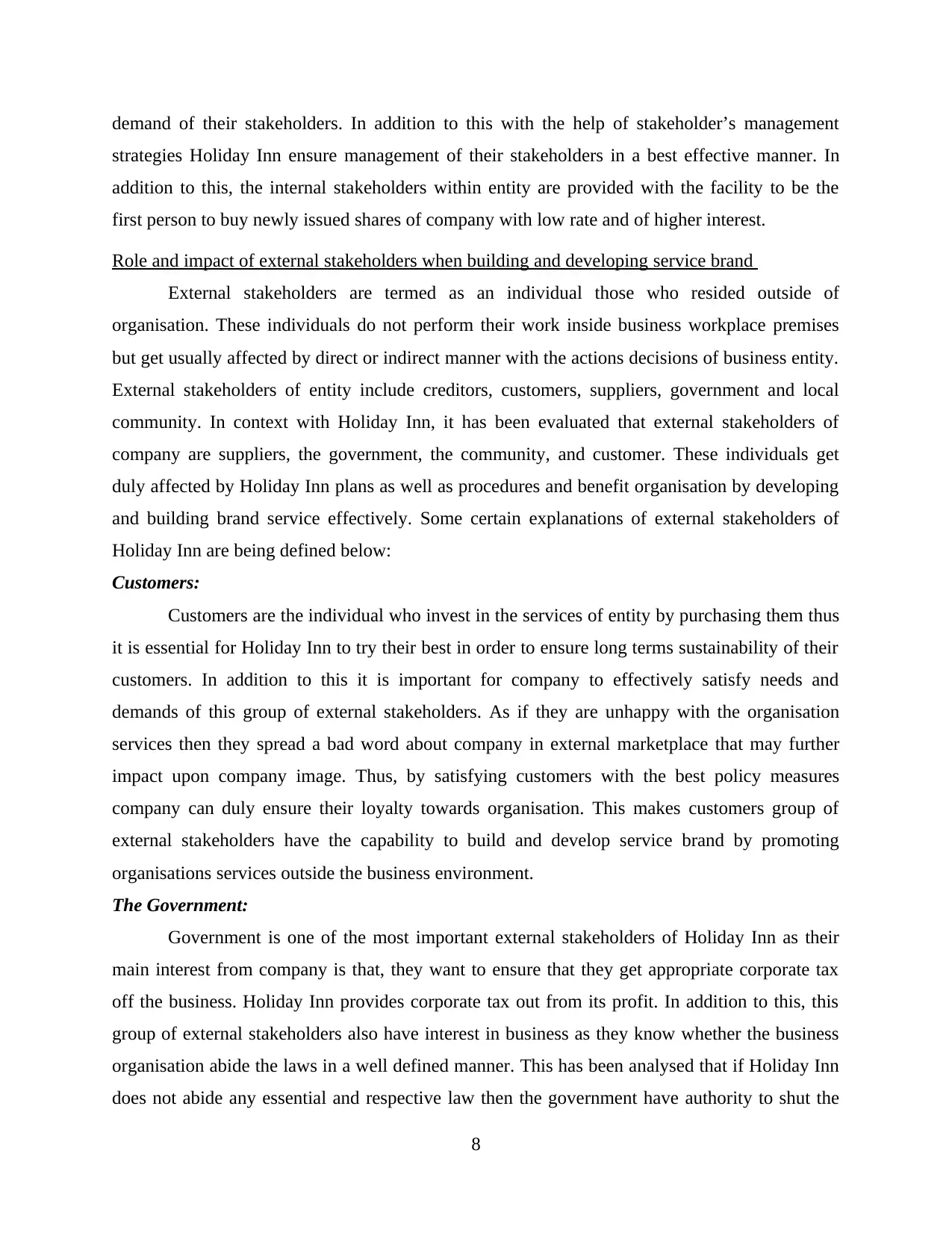
demand of their stakeholders. In addition to this with the help of stakeholder’s management
strategies Holiday Inn ensure management of their stakeholders in a best effective manner. In
addition to this, the internal stakeholders within entity are provided with the facility to be the
first person to buy newly issued shares of company with low rate and of higher interest.
Role and impact of external stakeholders when building and developing service brand
External stakeholders are termed as an individual those who resided outside of
organisation. These individuals do not perform their work inside business workplace premises
but get usually affected by direct or indirect manner with the actions decisions of business entity.
External stakeholders of entity include creditors, customers, suppliers, government and local
community. In context with Holiday Inn, it has been evaluated that external stakeholders of
company are suppliers, the government, the community, and customer. These individuals get
duly affected by Holiday Inn plans as well as procedures and benefit organisation by developing
and building brand service effectively. Some certain explanations of external stakeholders of
Holiday Inn are being defined below:
Customers:
Customers are the individual who invest in the services of entity by purchasing them thus
it is essential for Holiday Inn to try their best in order to ensure long terms sustainability of their
customers. In addition to this it is important for company to effectively satisfy needs and
demands of this group of external stakeholders. As if they are unhappy with the organisation
services then they spread a bad word about company in external marketplace that may further
impact upon company image. Thus, by satisfying customers with the best policy measures
company can duly ensure their loyalty towards organisation. This makes customers group of
external stakeholders have the capability to build and develop service brand by promoting
organisations services outside the business environment.
The Government:
Government is one of the most important external stakeholders of Holiday Inn as their
main interest from company is that, they want to ensure that they get appropriate corporate tax
off the business. Holiday Inn provides corporate tax out from its profit. In addition to this, this
group of external stakeholders also have interest in business as they know whether the business
organisation abide the laws in a well defined manner. This has been analysed that if Holiday Inn
does not abide any essential and respective law then the government have authority to shut the
8
strategies Holiday Inn ensure management of their stakeholders in a best effective manner. In
addition to this, the internal stakeholders within entity are provided with the facility to be the
first person to buy newly issued shares of company with low rate and of higher interest.
Role and impact of external stakeholders when building and developing service brand
External stakeholders are termed as an individual those who resided outside of
organisation. These individuals do not perform their work inside business workplace premises
but get usually affected by direct or indirect manner with the actions decisions of business entity.
External stakeholders of entity include creditors, customers, suppliers, government and local
community. In context with Holiday Inn, it has been evaluated that external stakeholders of
company are suppliers, the government, the community, and customer. These individuals get
duly affected by Holiday Inn plans as well as procedures and benefit organisation by developing
and building brand service effectively. Some certain explanations of external stakeholders of
Holiday Inn are being defined below:
Customers:
Customers are the individual who invest in the services of entity by purchasing them thus
it is essential for Holiday Inn to try their best in order to ensure long terms sustainability of their
customers. In addition to this it is important for company to effectively satisfy needs and
demands of this group of external stakeholders. As if they are unhappy with the organisation
services then they spread a bad word about company in external marketplace that may further
impact upon company image. Thus, by satisfying customers with the best policy measures
company can duly ensure their loyalty towards organisation. This makes customers group of
external stakeholders have the capability to build and develop service brand by promoting
organisations services outside the business environment.
The Government:
Government is one of the most important external stakeholders of Holiday Inn as their
main interest from company is that, they want to ensure that they get appropriate corporate tax
off the business. Holiday Inn provides corporate tax out from its profit. In addition to this, this
group of external stakeholders also have interest in business as they know whether the business
organisation abide the laws in a well defined manner. This has been analysed that if Holiday Inn
does not abide any essential and respective law then the government have authority to shut the
8
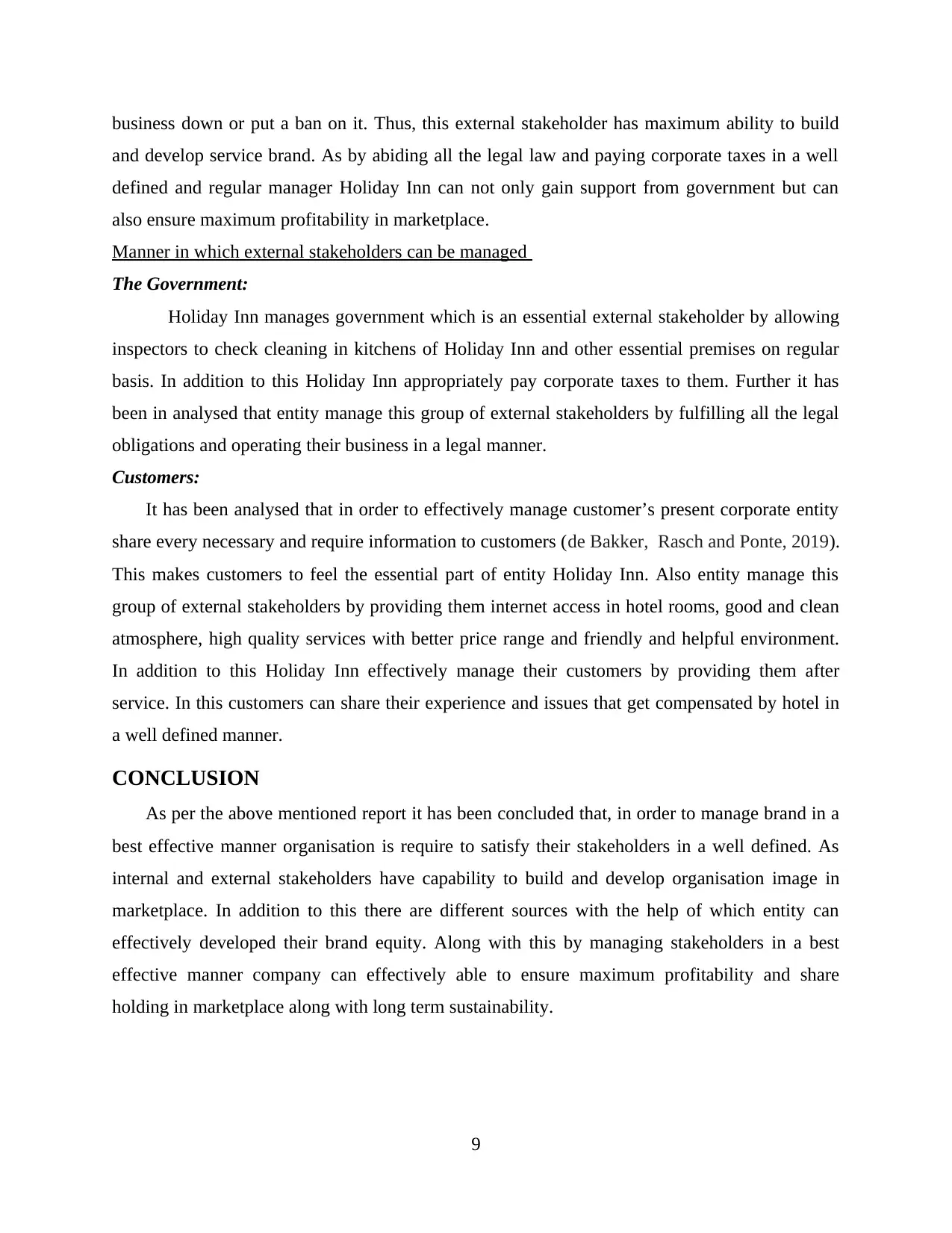
business down or put a ban on it. Thus, this external stakeholder has maximum ability to build
and develop service brand. As by abiding all the legal law and paying corporate taxes in a well
defined and regular manager Holiday Inn can not only gain support from government but can
also ensure maximum profitability in marketplace.
Manner in which external stakeholders can be managed
The Government:
Holiday Inn manages government which is an essential external stakeholder by allowing
inspectors to check cleaning in kitchens of Holiday Inn and other essential premises on regular
basis. In addition to this Holiday Inn appropriately pay corporate taxes to them. Further it has
been in analysed that entity manage this group of external stakeholders by fulfilling all the legal
obligations and operating their business in a legal manner.
Customers:
It has been analysed that in order to effectively manage customer’s present corporate entity
share every necessary and require information to customers (de Bakker, Rasch and Ponte, 2019).
This makes customers to feel the essential part of entity Holiday Inn. Also entity manage this
group of external stakeholders by providing them internet access in hotel rooms, good and clean
atmosphere, high quality services with better price range and friendly and helpful environment.
In addition to this Holiday Inn effectively manage their customers by providing them after
service. In this customers can share their experience and issues that get compensated by hotel in
a well defined manner.
CONCLUSION
As per the above mentioned report it has been concluded that, in order to manage brand in a
best effective manner organisation is require to satisfy their stakeholders in a well defined. As
internal and external stakeholders have capability to build and develop organisation image in
marketplace. In addition to this there are different sources with the help of which entity can
effectively developed their brand equity. Along with this by managing stakeholders in a best
effective manner company can effectively able to ensure maximum profitability and share
holding in marketplace along with long term sustainability.
9
and develop service brand. As by abiding all the legal law and paying corporate taxes in a well
defined and regular manager Holiday Inn can not only gain support from government but can
also ensure maximum profitability in marketplace.
Manner in which external stakeholders can be managed
The Government:
Holiday Inn manages government which is an essential external stakeholder by allowing
inspectors to check cleaning in kitchens of Holiday Inn and other essential premises on regular
basis. In addition to this Holiday Inn appropriately pay corporate taxes to them. Further it has
been in analysed that entity manage this group of external stakeholders by fulfilling all the legal
obligations and operating their business in a legal manner.
Customers:
It has been analysed that in order to effectively manage customer’s present corporate entity
share every necessary and require information to customers (de Bakker, Rasch and Ponte, 2019).
This makes customers to feel the essential part of entity Holiday Inn. Also entity manage this
group of external stakeholders by providing them internet access in hotel rooms, good and clean
atmosphere, high quality services with better price range and friendly and helpful environment.
In addition to this Holiday Inn effectively manage their customers by providing them after
service. In this customers can share their experience and issues that get compensated by hotel in
a well defined manner.
CONCLUSION
As per the above mentioned report it has been concluded that, in order to manage brand in a
best effective manner organisation is require to satisfy their stakeholders in a well defined. As
internal and external stakeholders have capability to build and develop organisation image in
marketplace. In addition to this there are different sources with the help of which entity can
effectively developed their brand equity. Along with this by managing stakeholders in a best
effective manner company can effectively able to ensure maximum profitability and share
holding in marketplace along with long term sustainability.
9
⊘ This is a preview!⊘
Do you want full access?
Subscribe today to unlock all pages.

Trusted by 1+ million students worldwide
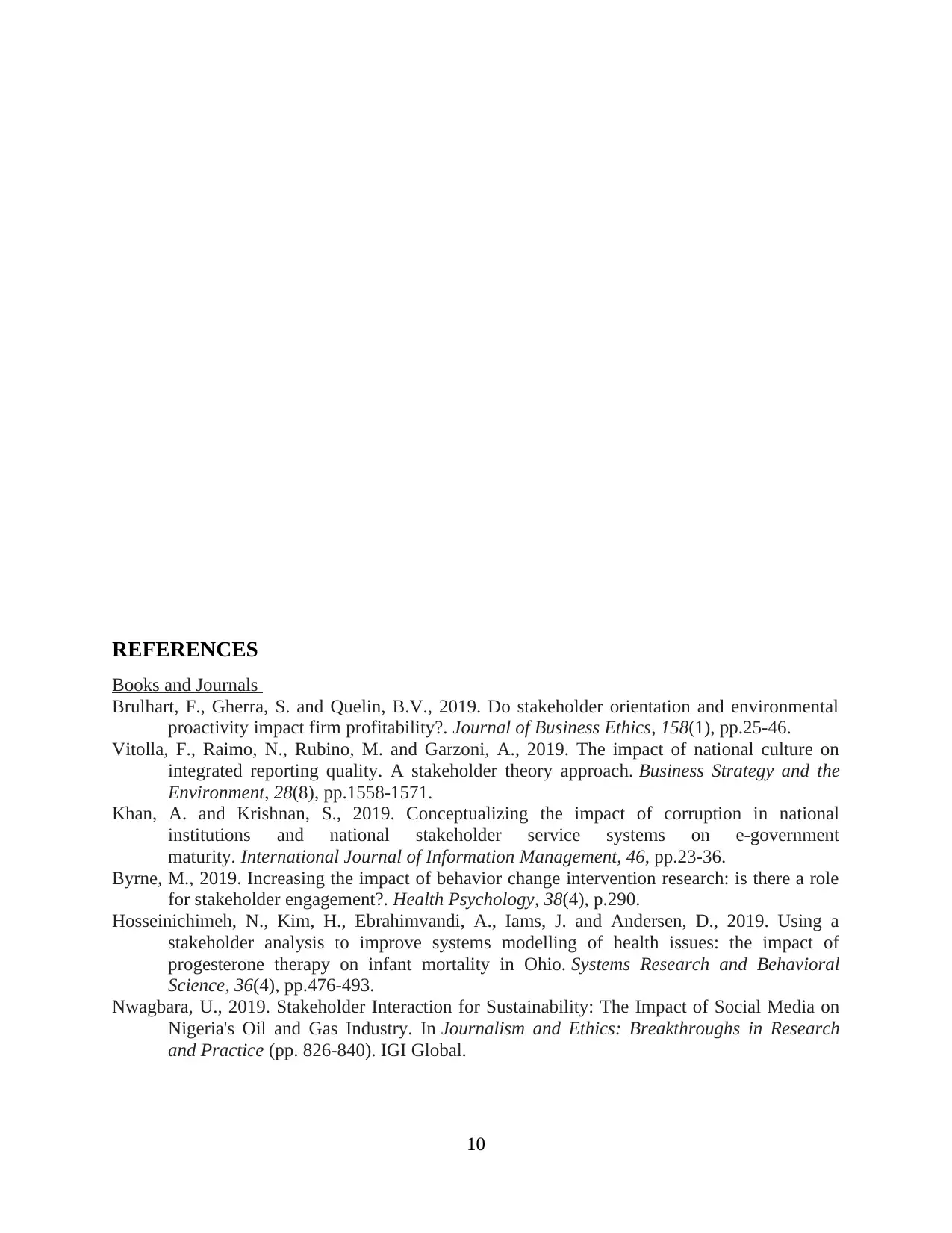
REFERENCES
Books and Journals
Brulhart, F., Gherra, S. and Quelin, B.V., 2019. Do stakeholder orientation and environmental
proactivity impact firm profitability?. Journal of Business Ethics, 158(1), pp.25-46.
Vitolla, F., Raimo, N., Rubino, M. and Garzoni, A., 2019. The impact of national culture on
integrated reporting quality. A stakeholder theory approach. Business Strategy and the
Environment, 28(8), pp.1558-1571.
Khan, A. and Krishnan, S., 2019. Conceptualizing the impact of corruption in national
institutions and national stakeholder service systems on e-government
maturity. International Journal of Information Management, 46, pp.23-36.
Byrne, M., 2019. Increasing the impact of behavior change intervention research: is there a role
for stakeholder engagement?. Health Psychology, 38(4), p.290.
Hosseinichimeh, N., Kim, H., Ebrahimvandi, A., Iams, J. and Andersen, D., 2019. Using a
stakeholder analysis to improve systems modelling of health issues: the impact of
progesterone therapy on infant mortality in Ohio. Systems Research and Behavioral
Science, 36(4), pp.476-493.
Nwagbara, U., 2019. Stakeholder Interaction for Sustainability: The Impact of Social Media on
Nigeria's Oil and Gas Industry. In Journalism and Ethics: Breakthroughs in Research
and Practice (pp. 826-840). IGI Global.
10
Books and Journals
Brulhart, F., Gherra, S. and Quelin, B.V., 2019. Do stakeholder orientation and environmental
proactivity impact firm profitability?. Journal of Business Ethics, 158(1), pp.25-46.
Vitolla, F., Raimo, N., Rubino, M. and Garzoni, A., 2019. The impact of national culture on
integrated reporting quality. A stakeholder theory approach. Business Strategy and the
Environment, 28(8), pp.1558-1571.
Khan, A. and Krishnan, S., 2019. Conceptualizing the impact of corruption in national
institutions and national stakeholder service systems on e-government
maturity. International Journal of Information Management, 46, pp.23-36.
Byrne, M., 2019. Increasing the impact of behavior change intervention research: is there a role
for stakeholder engagement?. Health Psychology, 38(4), p.290.
Hosseinichimeh, N., Kim, H., Ebrahimvandi, A., Iams, J. and Andersen, D., 2019. Using a
stakeholder analysis to improve systems modelling of health issues: the impact of
progesterone therapy on infant mortality in Ohio. Systems Research and Behavioral
Science, 36(4), pp.476-493.
Nwagbara, U., 2019. Stakeholder Interaction for Sustainability: The Impact of Social Media on
Nigeria's Oil and Gas Industry. In Journalism and Ethics: Breakthroughs in Research
and Practice (pp. 826-840). IGI Global.
10
Paraphrase This Document
Need a fresh take? Get an instant paraphrase of this document with our AI Paraphraser
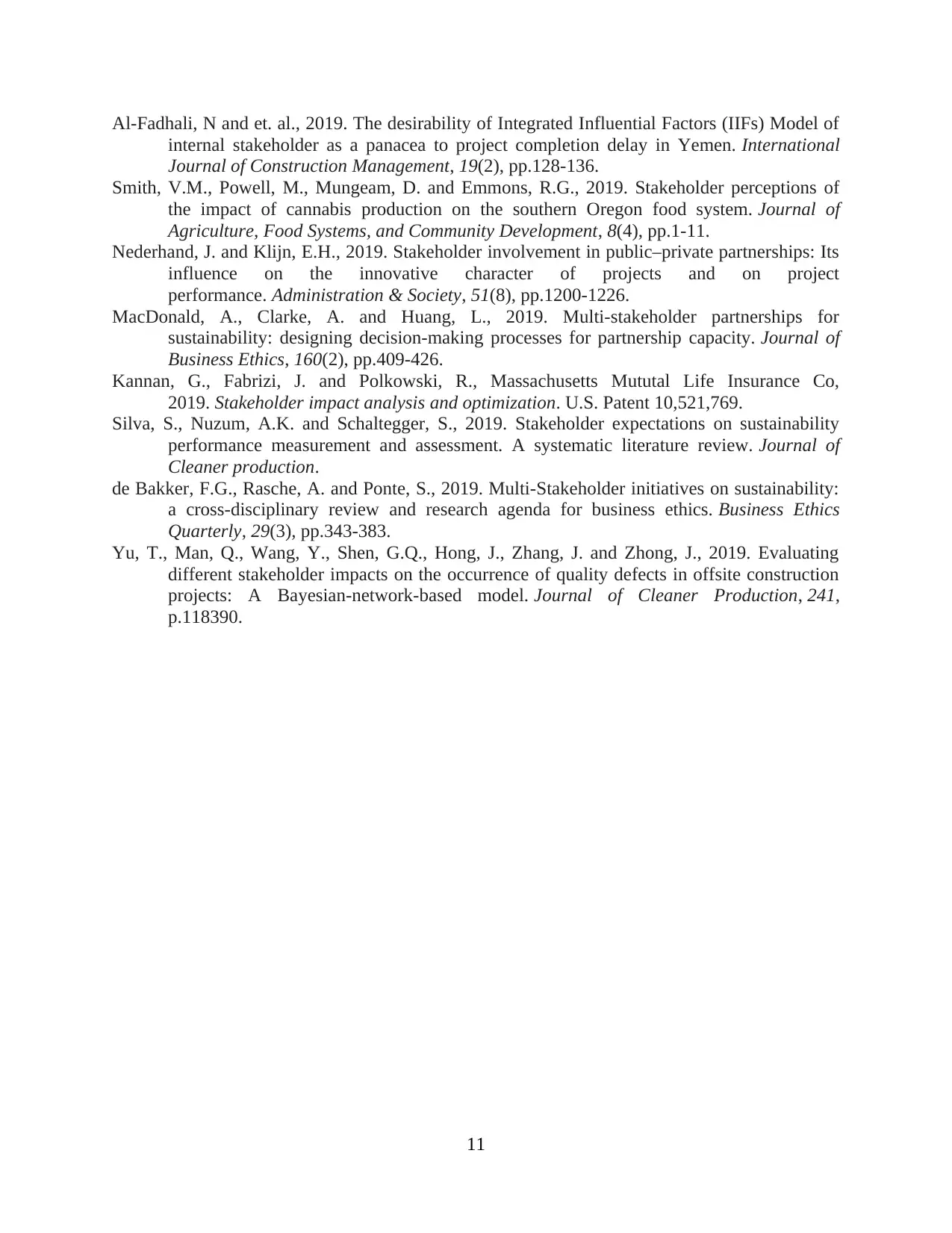
Al-Fadhali, N and et. al., 2019. The desirability of Integrated Influential Factors (IIFs) Model of
internal stakeholder as a panacea to project completion delay in Yemen. International
Journal of Construction Management, 19(2), pp.128-136.
Smith, V.M., Powell, M., Mungeam, D. and Emmons, R.G., 2019. Stakeholder perceptions of
the impact of cannabis production on the southern Oregon food system. Journal of
Agriculture, Food Systems, and Community Development, 8(4), pp.1-11.
Nederhand, J. and Klijn, E.H., 2019. Stakeholder involvement in public–private partnerships: Its
influence on the innovative character of projects and on project
performance. Administration & Society, 51(8), pp.1200-1226.
MacDonald, A., Clarke, A. and Huang, L., 2019. Multi-stakeholder partnerships for
sustainability: designing decision-making processes for partnership capacity. Journal of
Business Ethics, 160(2), pp.409-426.
Kannan, G., Fabrizi, J. and Polkowski, R., Massachusetts Mututal Life Insurance Co,
2019. Stakeholder impact analysis and optimization. U.S. Patent 10,521,769.
Silva, S., Nuzum, A.K. and Schaltegger, S., 2019. Stakeholder expectations on sustainability
performance measurement and assessment. A systematic literature review. Journal of
Cleaner production.
de Bakker, F.G., Rasche, A. and Ponte, S., 2019. Multi-Stakeholder initiatives on sustainability:
a cross-disciplinary review and research agenda for business ethics. Business Ethics
Quarterly, 29(3), pp.343-383.
Yu, T., Man, Q., Wang, Y., Shen, G.Q., Hong, J., Zhang, J. and Zhong, J., 2019. Evaluating
different stakeholder impacts on the occurrence of quality defects in offsite construction
projects: A Bayesian-network-based model. Journal of Cleaner Production, 241,
p.118390.
11
internal stakeholder as a panacea to project completion delay in Yemen. International
Journal of Construction Management, 19(2), pp.128-136.
Smith, V.M., Powell, M., Mungeam, D. and Emmons, R.G., 2019. Stakeholder perceptions of
the impact of cannabis production on the southern Oregon food system. Journal of
Agriculture, Food Systems, and Community Development, 8(4), pp.1-11.
Nederhand, J. and Klijn, E.H., 2019. Stakeholder involvement in public–private partnerships: Its
influence on the innovative character of projects and on project
performance. Administration & Society, 51(8), pp.1200-1226.
MacDonald, A., Clarke, A. and Huang, L., 2019. Multi-stakeholder partnerships for
sustainability: designing decision-making processes for partnership capacity. Journal of
Business Ethics, 160(2), pp.409-426.
Kannan, G., Fabrizi, J. and Polkowski, R., Massachusetts Mututal Life Insurance Co,
2019. Stakeholder impact analysis and optimization. U.S. Patent 10,521,769.
Silva, S., Nuzum, A.K. and Schaltegger, S., 2019. Stakeholder expectations on sustainability
performance measurement and assessment. A systematic literature review. Journal of
Cleaner production.
de Bakker, F.G., Rasche, A. and Ponte, S., 2019. Multi-Stakeholder initiatives on sustainability:
a cross-disciplinary review and research agenda for business ethics. Business Ethics
Quarterly, 29(3), pp.343-383.
Yu, T., Man, Q., Wang, Y., Shen, G.Q., Hong, J., Zhang, J. and Zhong, J., 2019. Evaluating
different stakeholder impacts on the occurrence of quality defects in offsite construction
projects: A Bayesian-network-based model. Journal of Cleaner Production, 241,
p.118390.
11

12
⊘ This is a preview!⊘
Do you want full access?
Subscribe today to unlock all pages.

Trusted by 1+ million students worldwide
1 out of 12
Related Documents
Your All-in-One AI-Powered Toolkit for Academic Success.
+13062052269
info@desklib.com
Available 24*7 on WhatsApp / Email
![[object Object]](/_next/static/media/star-bottom.7253800d.svg)
Unlock your academic potential
Copyright © 2020–2026 A2Z Services. All Rights Reserved. Developed and managed by ZUCOL.





